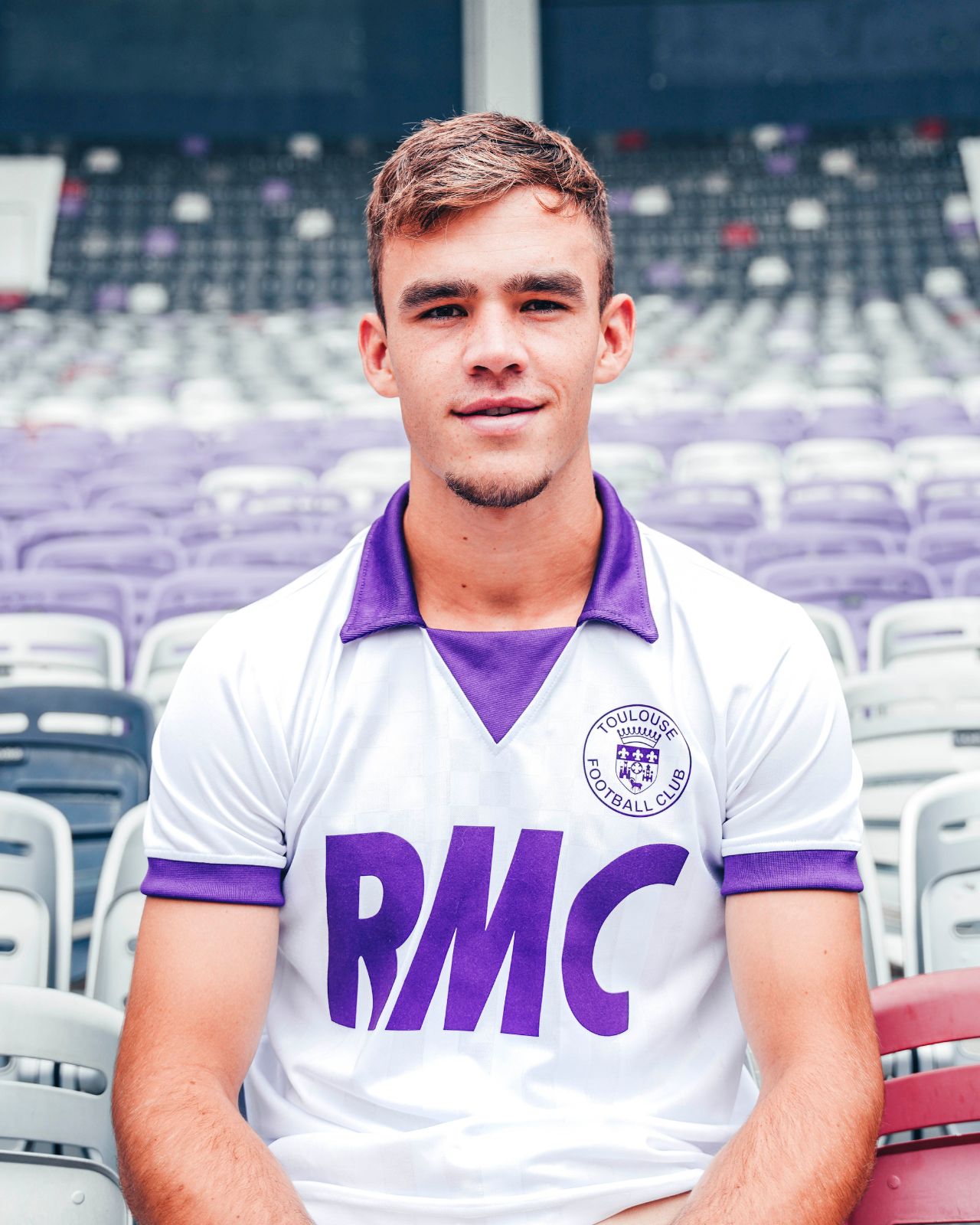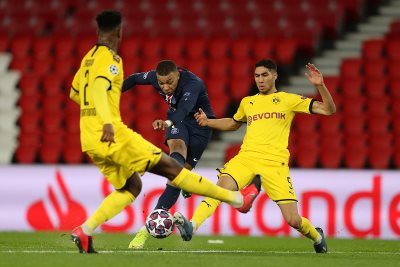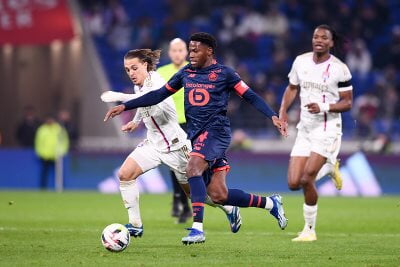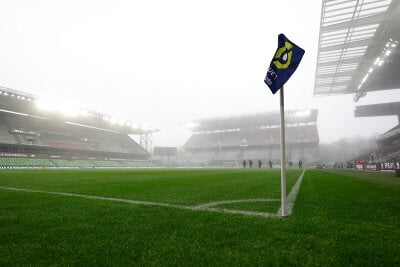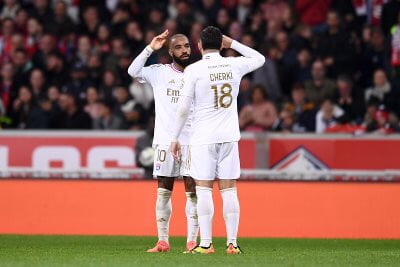Newly-minted Dutch international Thijs Dallinga has scored almost 30 goals since his arrival at Toulouse FC a year and a half ago. His role models and areas of to improve, his duels with defenders, penalties, trash talking... and more. Ahead of the Trophée des Champions, here's our interview.
Last summer, you were again given the number 9 after playing your first season in Toulouse with number 27…
Yes, this is the number that all attackers want! We are all the same! As I had a good season with number 27, I hesitated a little before changing but I had almost always played with number 9 before that so when the opportunity presented itself...
You scored 12 goals during your first season in Ligue 1 Uber Eats (18 in all competitions). Did you expect to start this well?
It would be an exaggeration to say that I expected it because I came from the Dutch second tier and I knew that here, the level of the league would be much higher. So at the beginning, I didn't really know what to expect, I just wanted to adapt as quickly as possible. I needed a little time but I was lucky to score quickly. And finally, the team had a great season and so did I.
During this first season, you scored 9 of your 12 league goals after Christmas (15 of your 18 goals in all competitions). How do you explain this difference in performance?
It's difficult... I scored two goals in the first few games, which made me think that it wouldn't be that difficult for me to play at this level. I had confidence in myself. But at the same time, I felt that I needed time to adapt both mentally and physically. I'm talking about the speed of the game, the quality of my opponents... At my age, it's normal to need a little time. I also had to develop connections with my new teammates; we had to get to know each other. During the second half of the season, the team was doing well and we, the attackers, depended a lot on the rest of the team. If things go well, it makes our job easier, we have more opportunities.
To go back in time a little, have you always played striker?
Always! I always played as a 9 or false 9 but I was always very close to the opponent's goal. Since I started playing football, the most important thing for me is scoring. So I always wanted to play up front.
You went through the Feyenoord academy and then Emmen and Groningen before impressing with Excelsior Rotterdam, in the Dutch second tier, where you finished top scorer. On the pitch, do they ask you different things in France compared to what they asked of you in the Netherlands?
It's not a country thing, what you're asked depends on the team you play for. In a team that is fighting to survive versus a team that is aiming for the title, they are going to ask of you different things. What makes the difference is the club and the coach of course. But yes, there are big differences between what I experienced in the Netherlands and what I have experienced since I have been in Toulouse.
For example?
First of all, you should know that when I signed for Excelsior Rotterdam, I made the choice to go down a notch after several seasons in Groningen, in the Eredivisie. I wanted to have more playing time and be able to prove myself, which I had the chance to do. But of course, there is a big difference between the Dutch second division and Ligue 1 Uber Eats: the capacity of the stadiums, the budget of the clubs and therefore the quality of the players... It is normal that a league which is of the top 5 in Europe like the French top flight is far above the Dutch second tier, a league of lower quality but where there are many young players who want to show themselves, like me at the time.
You were talking about the quality of the players here. Even though you're only 23, who are the defenders who have given you the most trouble so far?
The best I have faced was Kevin Danso from Lens. He has all the qualities that make him a good defender: he is strong and aggressive in duels but he is also fast and he reads the game very well. If an attacker is going to run deep, he anticipates it straight away. There is also Chancel Mbemba from Marseille against whom it is hard to play. He too is a complete central defender. He is strong, fast and he reads the game quickly.
To now talk about the striker position in detail, what is your definition of the perfect striker?
It's is an attacker comfortable with his feet, capable of participating in his team's play but also capable of making deep runs in behind the defense. He is an attacker who can be dangerous at any time and who forces his opponents to constantly monitor him. In summary, he is an attacker who can do a little bit of everything.
Precisely, to get a little closer to this ideal, what should you work on as a priority?
On my duels. I need to be even more aggressive. I'm not the clumsiest with the ball at my feet or when it comes to making deep runs, but I think I can improve in duels. I can be stronger, especially in the air.
Given your style of play, which attackers do you take inspiration from?
I like watching Erling Haaland because he very much corresponds to the definition I have given of the perfect striker. He is fast, technically comfortable, always dangerous, capable of scoring from anywhere... He is truly above everyone. There is a lot to learn from a striker like him. Last season, I liked Loïs Openda even if he has a different style from mine.
Since you played in Toulouse, you have scored a lot with one touch of the ball. Is this the ideal finish for you?
It's not something I particularly look for but it's the quickest way to finish a chance and it leaves little time for defenders or the goalkeeper to anticipate my play. It's more difficult for them. I often try to win the ball with one touch although, this season, I am trying to be able to score by making several touches in the area.
How do you prepare for a weekend's match?
We train all week depending on the match that is coming up, with specific exercises depending on the club we are going to face. Each player also receives a video with their own actions and sometimes elements about the next match. It helps us prepare and know who we are going to be dealing with, what the strengths of our adversaries are…
Some players follow very specific routines during their warm-up. Is this the case for you?
Not really. Before a match, I want to clear my mind, not think too much about what will happen or not happen. I don't impose anything in particular on myself. I just try to tell myself that I should have fun. I also tell myself: “Have confidence in yourself, you know what you are capable of. You've trained well all week and now it's time to show it, to give the fans what they expect."
As an attacker, you are sometimes engaged in a psychological battle with your direct opponents. What happens in the first minutes of a match?
Thanks to video, I know what the defenders like or don't like even before the match. There is of course a psychological aspect to the duel you may be waging against a defender because there are a lot of one-on-ones. It's part of the game and, as a striker, I like these matches within the match. Sometimes it's you who wins, sometimes it's the other person, but fortunately, I'm more often on the right side!
And trash talking?
Sometimes, the duel with your direct opponent is hard, aggressive, from the start of the match and it is true that we can exchange certain words. But I don't like to talk badly to my opponents. For me, it's useless. When people talk to me badly, it doesn't take me out of my game. It’s better to behave “normally” with your direct opponent, to be tough but within the rules. It happens like this with the vast majority of defenders. We have a lot of respect for each other.
This season, you are the penalty taker for Toulouse FC. Do you have a particular technique?
No, but I train a lot. Every day, I take several, to have a sense rhythm and know what to do in a match. But it's hard to work on them in training because the conditions have nothing to do with those of a match, where there is pressure, and the fans... From a technical point of view, if the penalty is well shot, strong, with confidence, it's practically impossible for the goalkeeper to stop it. This is what you need to keep in mind.
We know that goalkeepers watch videos of the penalty takers they are going to face. Is the opposite true?
I used to do it earlier in my career but now I don’t. It's in my head that it has to happen above all. If I am confident and I take my penalty well, no goalkeeper will be able to stop it. I don't even want to know if the goalkeeper dives to one side or the other more often. It's all up to me. And then if a goalkeeper has dived to the right the last six times and he dives to the left the next time, what happens?

